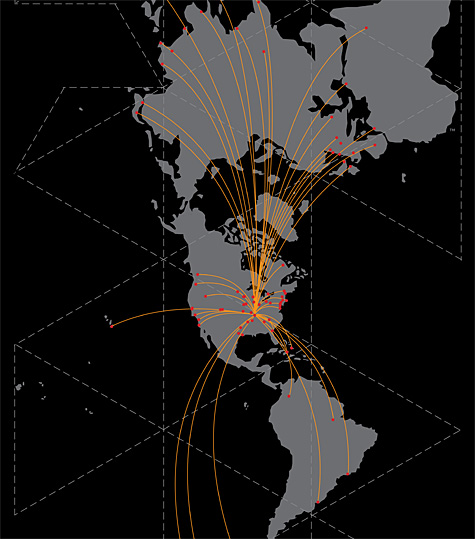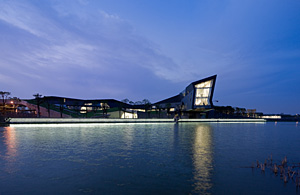
The world is getting smaller. Digital technologies collapse distances while modern infrastructure perforates old borders.
But cities are getting bigger. Today, more than 20 cities top 10 million inhabitants. By 2030, estimates the United Nations, 60 percent of the world’s people will live in urban areas.
That growth represents the key challenge of the 21st century, says John Hoal, associate professor and director of the Master of Urban Design (MUD) program in the Sam Fox School of Design & Visual Arts. But it also represents an important opportunity.
“In many ways, the future of sustainability will be decided in and through the design of the city and its necessary supply chain,” Hoal says. Issues relating to climate change, CO2 emissions, pollution, congestion, sanitation, water, energy, food, housing — all will need to be solved, or not solved, within the context of the city.
“From our perspective, the emerging global cities are actually more important to the future of the world than many nations,” Hoal adds. “At their best, cities tend to be the places for the effective creation of wealth, culture, opportunity, diversity, productivity and innovation, and at their worst, places of pollution and slums.”
URBANISM(S): Sustainable Cities for One Planet
In November, the Sam Fox School will present “URBANISM(S): Sustainable Cities for One Planet,” an international symposium exploring the future of global urban design.
The two-day event will feature dozens of speakers and panelists investigating both the potentials and demands of sustainable cities. Topics will range from the ecology, infrastructure and social life of the city to its role as a hub for creativity and innovation.

Pritzker Prize-winning architect Thom Mayne will deliver the Fumihiko Maki Lecture, the symposium’s keynote address.
Titled “Combinatory Urbanism: The Complex Behavior of Collective Form,” the talk will survey a handful of Mayne’s recent projects and research, which together amount to a manifesto for strategically re-envisioning the practice of urban design. Notably, Mayne’s work builds upon the book Collective Form, which was written by Maki, a fellow Pritzker winner, during his tenure as faculty at Washington University.
Other speakers will include Hoal and WUSTL architectural historian Eric Mumford, as well as Teddy Cruz, Chris Reed, Ken Greenberg, Mitesh Dixit, Felipe Correa, Douglas Voigt, Eric Zencey and Nan Ellin.
“The world today is rapidly urbanizing,” says Bruce Lindsey, dean of architecture and the E. Desmond Lee Professor for Community Collaboration. “It is growing more socially complex and economically integrated, and is ever more confronted by vast shifts in natural resources.
“We’re honored to welcome some of the nation’s leading thinkers on these issues,” Lindsey adds. “The intent of the symposium is to discuss and debate the future of urban design education and practice.
“At the same time, we hope to demonstrate the many powerful ways that art and design can contribute to the challenges ahead.”
Master of Urban Design
URBANISM(S) comes as part of a series of events celebrating the 50th anniversary of the MUD program. Founded in 1961 by Maki and Roger Montgomery, the program is the second oldest in the nation. Alumni are now at major planning, architecture, landscape architecture and urban design practices around the world.
As part of the symposium, Hoal will lead a discussion of the MUD program’s distinguished history, as well as a discussion speculating about the profession’s next 50 years.
RSVPs and sponsors
“URBANISM(S): Sustainable Cities for One Planet” takes place in the Sam Fox School’s Steinberg and Givens halls, and in the Mildred Lane Kemper Art Museum. All three buildings are located adjacent to one another near the intersection of Skinker and Forsyth boulevards.
All sessions are free and open to the public, though RSVPs are requested. For more information or a complete schedule, visit samfoxschool.wustl.edu/events/urbanisms. RSVP to samfoxschool@wustl.edu.
The symposium is sponsored by the Sam Fox School of Design & Visual Arts and by HOK, Christner, SOM, Arcturis and The Lawrence Group.